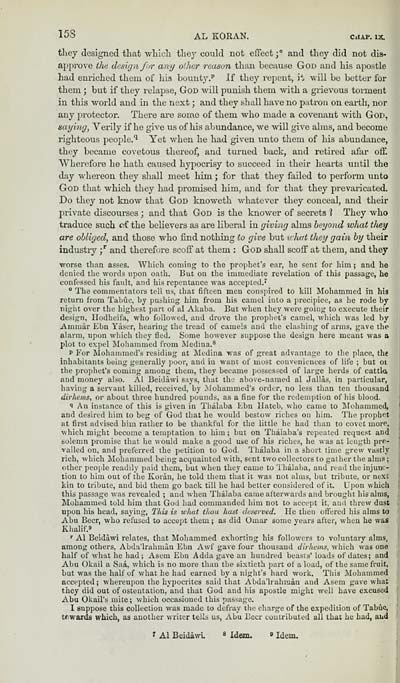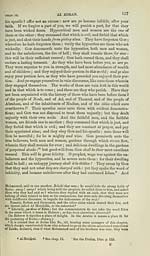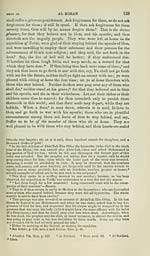Download files
Complete book:
Individual page:
Thumbnail gallery: Grid view | List view

15S AL KORAN. CJAP. ix.
tliey designed that wlilcli they could not effect j** and tlioy did not dis-
ap})rove the design for any ollter reason than because God and his a})ostle
had enriched them of his bouut3\P If they repent, Vj will be better for
them ; but if they relapse, God will punish them with a grievous torment
in this world and in the next ; and they shall have no patron on earth, nor
any pi-otector. There are some of them who made a covenant with God,
saying, Verily if he give us of his abundance, we will give alms, and become
righteous people.*^ Yet when he had given unto them of his abvmdance,
they became covetous thereof, and turned back, and retired afar off.
Wherefore he hath caused hypocrisy to succeed in their hearts until the
day whereon they shall meet him ; for that they failed to perform unto
God tliat which they had promised him, and for that they prevaricated.
Do they not know that God knoweth whatever they conceal, and their
private discourses ; and that God is the knower of secrets ? They who
traduce such of the believers as are liberal in giving alms beyond what they
are obliged, and those who find nothing to give but uhat they gain by their
indufairy ;'' and therefore scoff at them : God shall scoff at them, and they
worse than asses. Which coming to the prophet's ear, he sent for him ; and he
denied the words upon oath. But on the immediate revelation of this passage, he
confessed his fault, and his repentance was accepted.^
** The commentators tell us, that fifteen men conspired to kill Mohammed in his
return from Tabuc, by pushing him from his camel into a precipice, as he rode by
night over the highest part of al Akaba. But when they were going to execute their
design, Hodheifa, who followed, and drove the prophet's camel, which was led by
Ammar Ebn Yascr, hearing tlie tread of camels and the clashing of arms, gave the
alarm, upon which they fled. Some however suppose the design here meant was a
plot to expel Mohammed from Medina.^
P For Mohammed's residing at Medina was of great advantage to the place, the
inhabitants being generally poor, and in want of most conveniences of life ; but ol
the prophet's coming amont; them, they became possessed of large herds of cattla
and money also. Al Beidawi says, that the above-named al Jallas, in particular,
having a servant killed, received, by Mohammed's order, no less than ten thousand
dirhems, or about three hundred pounds, as a fine for the rcJemjjtion of his blood.
<i An instance of this is given in Thalaba Ebn Hateb, who came to Mohammed,
and desired him to beg of God that he would bestow riches on him. The prophet
at first advised him rather to be thankful for the little he had than to covet more,
Mhich might become a temptation to him ; but on Thalaba's repeated request and
solemn promise that he would make a good use of his riches, he was at length pre-
vailed on, and preferred the petition to God. Thalaba in a short time grew vastly
rich, which Mohammed being acquainted with, sent two collectors to gather the alms ;
other peo]jle readily paid them, but when they came to Thalaba, and read the injunc-
tion to him out of the Koran, he told them that it was not alms, but tribute, or next
kin to tribute, and bid them go back till he had better considered of it. Upon which
this passage was revealed ; and when Thalaba came afterwards and brought his alms,
Mohammed told him that God had commanded him not to accept it, and threw dust
upon his head, saying, This is what thou hast deserved. He then offered his alms to
Abu Beer, who refused to accept them ; as did Omar some years after, when he was
Khalif.9
■■ Al Beidawi relates, that Mohammed exhorting his followers to voluntary alms,
among others, Abda'lrahman Ebn Awf gave four thousand dirhems, which was one
half of what he had; Asem Ebn Adda gave an hundred beasts' loads of dates; and
Abu Okail a Saa, which is no more than the sixtieth part of a load, of the same fruit,
but was the half of what he had earned by a night's hard work. This Mohammed
accepted; whereupon the hypocrites said that Abda'lrahman and Asem gave what
they did out of ostentation, and that God and his apostle might well have excused
Abu Okail's mite; which occasioned this passage.
I suppose this collection was made to defray the charge of the expedition of Tabuc,
tr-wardfi which, as another writer tells us, Abu Beer contributed all that he had, and
^ Al BeidawL ^ Idem. » Idem.
tliey designed that wlilcli they could not effect j** and tlioy did not dis-
ap})rove the design for any ollter reason than because God and his a})ostle
had enriched them of his bouut3\P If they repent, Vj will be better for
them ; but if they relapse, God will punish them with a grievous torment
in this world and in the next ; and they shall have no patron on earth, nor
any pi-otector. There are some of them who made a covenant with God,
saying, Verily if he give us of his abundance, we will give alms, and become
righteous people.*^ Yet when he had given unto them of his abvmdance,
they became covetous thereof, and turned back, and retired afar off.
Wherefore he hath caused hypocrisy to succeed in their hearts until the
day whereon they shall meet him ; for that they failed to perform unto
God tliat which they had promised him, and for that they prevaricated.
Do they not know that God knoweth whatever they conceal, and their
private discourses ; and that God is the knower of secrets ? They who
traduce such of the believers as are liberal in giving alms beyond what they
are obliged, and those who find nothing to give but uhat they gain by their
indufairy ;'' and therefore scoff at them : God shall scoff at them, and they
worse than asses. Which coming to the prophet's ear, he sent for him ; and he
denied the words upon oath. But on the immediate revelation of this passage, he
confessed his fault, and his repentance was accepted.^
** The commentators tell us, that fifteen men conspired to kill Mohammed in his
return from Tabuc, by pushing him from his camel into a precipice, as he rode by
night over the highest part of al Akaba. But when they were going to execute their
design, Hodheifa, who followed, and drove the prophet's camel, which was led by
Ammar Ebn Yascr, hearing tlie tread of camels and the clashing of arms, gave the
alarm, upon which they fled. Some however suppose the design here meant was a
plot to expel Mohammed from Medina.^
P For Mohammed's residing at Medina was of great advantage to the place, the
inhabitants being generally poor, and in want of most conveniences of life ; but ol
the prophet's coming amont; them, they became possessed of large herds of cattla
and money also. Al Beidawi says, that the above-named al Jallas, in particular,
having a servant killed, received, by Mohammed's order, no less than ten thousand
dirhems, or about three hundred pounds, as a fine for the rcJemjjtion of his blood.
<i An instance of this is given in Thalaba Ebn Hateb, who came to Mohammed,
and desired him to beg of God that he would bestow riches on him. The prophet
at first advised him rather to be thankful for the little he had than to covet more,
Mhich might become a temptation to him ; but on Thalaba's repeated request and
solemn promise that he would make a good use of his riches, he was at length pre-
vailed on, and preferred the petition to God. Thalaba in a short time grew vastly
rich, which Mohammed being acquainted with, sent two collectors to gather the alms ;
other peo]jle readily paid them, but when they came to Thalaba, and read the injunc-
tion to him out of the Koran, he told them that it was not alms, but tribute, or next
kin to tribute, and bid them go back till he had better considered of it. Upon which
this passage was revealed ; and when Thalaba came afterwards and brought his alms,
Mohammed told him that God had commanded him not to accept it, and threw dust
upon his head, saying, This is what thou hast deserved. He then offered his alms to
Abu Beer, who refused to accept them ; as did Omar some years after, when he was
Khalif.9
■■ Al Beidawi relates, that Mohammed exhorting his followers to voluntary alms,
among others, Abda'lrahman Ebn Awf gave four thousand dirhems, which was one
half of what he had; Asem Ebn Adda gave an hundred beasts' loads of dates; and
Abu Okail a Saa, which is no more than the sixtieth part of a load, of the same fruit,
but was the half of what he had earned by a night's hard work. This Mohammed
accepted; whereupon the hypocrites said that Abda'lrahman and Asem gave what
they did out of ostentation, and that God and his apostle might well have excused
Abu Okail's mite; which occasioned this passage.
I suppose this collection was made to defray the charge of the expedition of Tabuc,
tr-wardfi which, as another writer tells us, Abu Beer contributed all that he had, and
^ Al BeidawL ^ Idem. » Idem.
Set display mode to: Large image | Transcription
Images and transcriptions on this page, including medium image downloads, may be used under the Creative Commons Attribution 4.0 International Licence unless otherwise stated. ![]()
| Early Gaelic Book Collections > J. F. Campbell Collection > Koran: or, Alcoran of Mohammed > (312) |
|---|
| Permanent URL | https://digital.nls.uk/77137527 |
|---|
| Description | Volumes from a collection of 610 books rich in Highland folklore, Ossianic literature and other Celtic subjects. Many of the books annotated by John Francis Campbell of Islay, who assembled the collection. |
|---|
| Description | Selected items from five 'Special and Named Printed Collections'. Includes books in Gaelic and other Celtic languages, works about the Gaels, their languages, literature, culture and history. |
|---|

